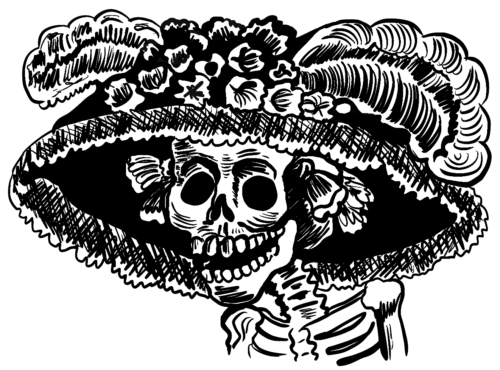“Quien quiera gozar de verasy divertirse un ratón,
venga con las calaverasa gozar en el panteón.”
– José Guadalupe Posada
“Whoever wants to truly enjoy
and have a bit of fun,
come with the skeletons
to delight in the graveyard.”
– José Guadalupe Posada
Imagine a poem that jokes about your death, turning the inevitable into a source of laughter and light. Imagine a celebration where death is not feared but embraced with humor, art, and creativity. Welcome to Día de Muertos. In this celebration, death is a guest of honor, and the line between life and death blurs as families honor their dead with humor and creativity. I bring the same spirit to Harvard in this article, through poems about death, consulting, and clubs.
Día de Muertos is a Mexican tradition celebrated on Nov. 2, dedicated to honor and remember loved ones who passed. This year will mark the second Día de Muertos I celebrate away from Mexico.
One of the things I miss the most is the art that blooms around this festivity. During this celebration, everyone puts their creativity at the service of the celebration of death. Streets come alive with beautiful parades, impressive paintings, creative make-up, and stunning ofrendas. Ofrendas are artful altars with food, drinks, flowers, and candies that families set up in Dia de Muertos for their dead. They do this to honor their memory and to express their love and appreciation for them. The celebration of death takes many forms and each expression is unique, but they are all similarly characterized by irreverence towards death. Here, I’d like to share one of those irreverent traditions: Calaveritas Literarias.
Literally translated as “Literary Skulls,” Calaveritas Literarias are traditional Mexican literary compositions in verse written in an ironic tone about death. They were originally born as satirical epitaphs, capturing the spirit of Día de Muertos by sardonically confronting mortality. They are playful texts that portray people as if they were already dead or about to die, allowing readers to laugh at the inevitable but also to celebrate it.
You might say, “Doesn’t this all sound a bit twisted?” But that’s the beauty: they’re comedic, light-hearted, and meant to express emotions that would normally be hard to express. In the Calaveritas, Death is not a source of fear but a familiar presence, adopting various names and forms, often referred to as the feminine “Catrina” or “la flaca”—always close and a part of life.
Consulting to death
At Harvard they rush, so sharp and so keen,
all chasing consulting, their ultimate dream.
With suits pressed and polished, they practice their pitch,
for a chance to advise the rich getting rich.
But La Catrina laughs, with a smile sly and wide,
“All of you are scrambling, no place to hide.
You’ll climb and you’ll hustle, networking with flair,
but Big Three or not, I’ll see you down there!”
La Catrina gets punched
At Harvard they punch, they wait in long lines,
hoping for clubs with prestige and designs.
The rounds feel intense, with each smile and each glance,
all for the clubs that might give them a chance.
But La Catrina chuckles, hidden in view,
“Clubs and connections won’t save any of you!
You hustle for status, you strive to impress,
but soon you’ll see, we’re all in the same mess.”
So at the club she planned to enter, all ready to rake,
the Harvard students she’d planned to take.
But then she got a letter, from a Final Club grand,
“Join us, dear Catrina, and rule the whole land!”
Intrigued by the offer, she gave it a shot,
through rounds and events, she fought for her spot.
When the final dinner came, she let out a cheer,
forgetting her duty to bring the end near.
Now dressed in a club tie, she laughs with delight,
leaving Harvard students to live one more night.
Frida López ’27 (fridalopezbravo@college.harvard.edu) is hoping to network with La Catrina in the next consulting recruiting season.

